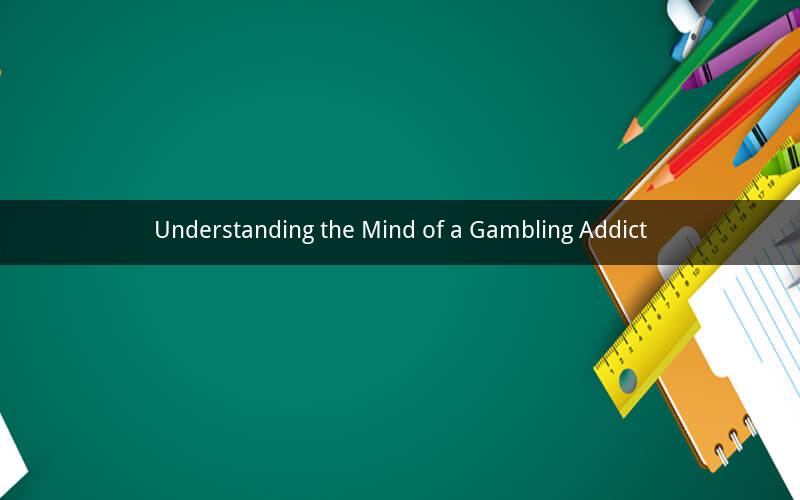
Gambling addiction, a form of impulse control disorder, has become an increasingly prevalent issue worldwide. It affects individuals from all walks of life, leading to significant consequences for both the addict and their loved ones. In this article, we will delve into the thought processes of a gambling addict, shedding light on the factors that contribute to their addiction and the challenges they face in overcoming it.
1. The allure of gambling
Gambling addicts are often drawn to the thrill and excitement that comes with the risk of winning big. The prospect of financial gain and the psychological rush of taking on a challenge can be incredibly enticing. This allure is further compounded by the availability of online gambling platforms, which allow addicts to access their favorite games at any time and from anywhere.
2. The psychological triggers
A gambling addict's thought process is often influenced by psychological triggers. These triggers can include past experiences, such as winning a significant amount of money or feeling a sense of control while playing. Additionally, environmental factors, such as being in a social setting where gambling is present, can also contribute to the development of addictive behavior.
3. The role of dopamine
The brain's reward system plays a crucial role in the development of gambling addiction. Dopamine, a neurotransmitter associated with pleasure and reward, is released when a person wins at gambling. Over time, the brain begins to associate gambling with a pleasurable experience, making it difficult for addicts to resist the urge to play.
4. The cycle of addiction
Gambling addicts often find themselves trapped in a cycle of addiction. They start by playing for fun, but as they continue to win, they become more and more invested in the game. Eventually, they may start chasing losses, trying to recoup their previous winnings. This cycle can be difficult to break, as the addict's brain becomes increasingly dependent on the dopamine rush that comes with winning.
5. The challenges of overcoming addiction
Overcoming a gambling addiction is a complex and challenging process. Many addicts struggle with feelings of guilt, shame, and fear of failure. They may also face external pressures from family and friends who are unaware of the extent of their addiction. Additionally, the psychological and emotional toll of addiction can make it difficult for addicts to rebuild their lives.
6. Treatment and support
For many gambling addicts, seeking treatment and support is a crucial step in overcoming their addiction. Treatment options may include therapy, support groups, and medication. Therapy can help addicts understand the root causes of their addiction and develop coping strategies to deal with triggers and cravings. Support groups, such as Gamblers Anonymous, provide a sense of community and understanding for those struggling with addiction.
7. The importance of self-awareness
Self-awareness is a key component of overcoming a gambling addiction. Addicts must be willing to confront their behavior and acknowledge the negative consequences it has had on their lives. By becoming more aware of their thoughts and actions, they can begin to make positive changes and take control of their addiction.
8. The role of family and friends
Family and friends play a crucial role in supporting a gambling addict on their journey to recovery. They can offer emotional support, encouragement, and practical assistance. It is important for loved ones to understand the nature of addiction and the challenges that come with it. By being supportive and understanding, they can help their loved one navigate the recovery process.
9. The future of gambling addiction treatment
As gambling addiction continues to rise, the field of treatment and support is evolving. New research and therapeutic approaches are being developed to help addicts overcome their addiction and rebuild their lives. The future of gambling addiction treatment looks promising, with a growing number of resources and support available for those in need.
10. Conclusion
Understanding the thought processes of a gambling addict is essential in addressing the challenges they face in overcoming their addiction. By recognizing the allure of gambling, the psychological triggers, and the role of dopamine, we can better support those struggling with this addiction. Treatment, support, and self-awareness are key components of recovery, and with the right resources and determination, gambling addicts can overcome their addiction and lead fulfilling lives.
Questions and Answers:
1. What are the primary psychological triggers that contribute to gambling addiction?
Answer: Psychological triggers can include past experiences of winning, feeling a sense of control while playing, and environmental factors such as being in a social setting where gambling is present.
2. How does the brain's reward system contribute to the development of gambling addiction?
Answer: The brain's reward system, specifically the release of dopamine, plays a crucial role. Winning at gambling triggers the release of dopamine, making the experience pleasurable and reinforcing the behavior.
3. What are the challenges faced by gambling addicts in overcoming their addiction?
Answer: Challenges include feelings of guilt, shame, fear of failure, external pressures from family and friends, and the psychological and emotional toll of addiction.
4. What types of treatment and support are available for gambling addicts?
Answer: Treatment options include therapy, support groups, and medication. Therapy helps addicts understand the root causes of their addiction and develop coping strategies, while support groups provide a sense of community and understanding.
5. How can family and friends support a gambling addict on their journey to recovery?
Answer: Family and friends can offer emotional support, encouragement, and practical assistance. It is important for them to understand the nature of addiction and be supportive and understanding throughout the recovery process.